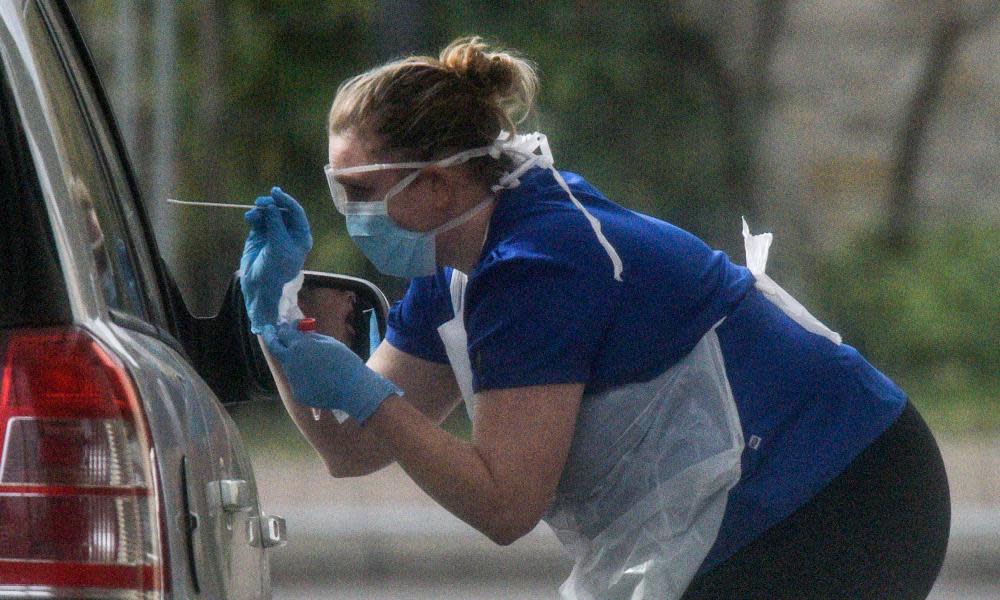Coronavirus: just 2,000 NHS frontline workers tested so far

Only 2,000 NHS frontline workers out of about half a million have been tested for coronavirus so far, despite up to one in four being off work with suspected symptoms in some areas of the country.
Amid criticism of the UK’s low testing numbers, No 10 said a “clear instruction” has been issued to hospitals to test as many staff as possible, with trusts allowed to decide how to split tests between workers and patients.
The latest figure of 2,000 workers tested in total shows about only 500 tests a day on doctors, nurses, paramedics and other medical staff are being carried out.
Downing Street said the coronavirus testing capacity stands at 12,750 – but only 8,630 tests were carried out on Monday.
Boris Johnson’s official spokesman said: “In terms of testing, as you know the NHS and Public Health England are working to increase the capacity.”
default
The government has blamed the slow rate of testing – compared with 70,000 a day in Germany – on a lack of some specialist chemical reagents and swabs.
Chris Hopson, the chief executive at NHS Providers, which represents hospital trusts, said one NHS trust can test only three staff members a day due to a lack of swabs.
He told BBC Radio 4’s World at One programme: “The key thing to understand is it’s the swabs and the reagent shortages that is the problem.
“I was talking to the largest trust, one of the largest trusts in the country this morning, who basically want to test many, many hundreds of their staff but they actually can’t because they’ve got a reagent shortage.
“So all we’re saying is that trusts will go as fast as they can, but unless we can solve those swab and reagent shortages then there will be a natural capacity limit to how many tests we can do.”
Matt Hancock, the health secretary, gave an order on Tuesday night for all spare coronavirus tests to be used for NHS workers, as some initial figures suggested only a small proportion of those in isolation appear to be really sick with the virus.
Hancock, who is in isolation himself, removed the cap on NHS staff being allowed access to only 15% of testing capacity while 85% was reserved for patients.
This has led to testing well below capacity for the past few days, but the Department of Health now hopes it will ramp up to more than 10,000 tests a day.
default
Hopson has highlighted “intriguing data from a very small sample size … only around 15% of those in 14-day isolation tested positive so the other 85% could come back to work”, which if “anything like right, is a huge opportunity”. Downing Street said it did not recognise those figures and suggested it would be better to wait for a wider sample size.
There is also frustration inside Whitehall that Public Health England (PHE) has been too rigorous about sticking to its own centralised testing and verified processes, before allowing it to be rolled out to more private labs around the country.
While the UK struggles to test NHS workers, experts have warned the country will need to widen its testing to the general public if it wants to ease lockdown measures, so it can ensure those infected strictly observe the quarantine.
Jonathan Ashworth, the shadow health secretary, said the UK “needs a clear national testing strategy for community testing and contact tracing”.
He added: “If delays in scaling up testing is lack of relevant chemicals. Why is the chemical industry saying it could make them if asked? If it’s about Public Health England validation surely ministers can pull everyone together to hammer out an urgent solution?”
PHE has resisted the idea of a return to community testing – the practice of testing everyone who has symptoms so that live cases can be quarantined effectively.
PHE is instead prioritising the need for an antibody test, showing who has already had the disease and therefore will be immune to it. However, this test has not yet been approved for use and there is a time lag of days before patients who have had coronavirus start showing the antibodies that prove they have been infected.

 Yahoo News
Yahoo News 
